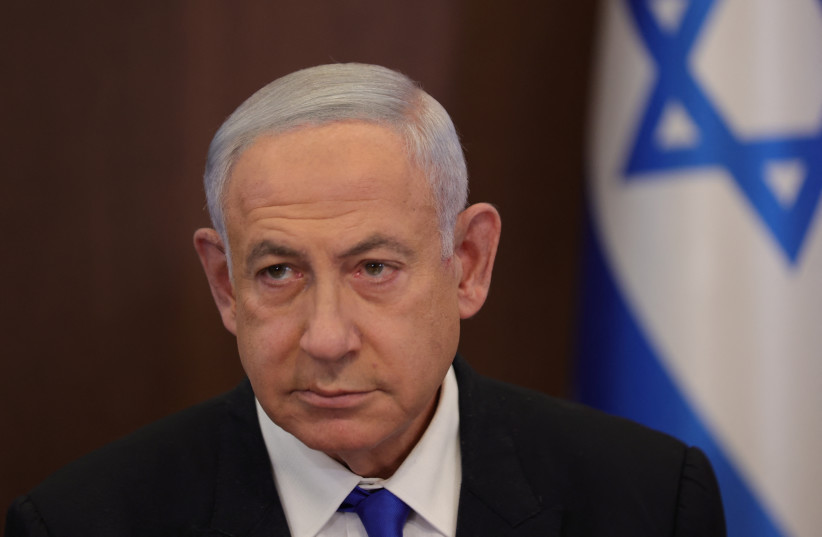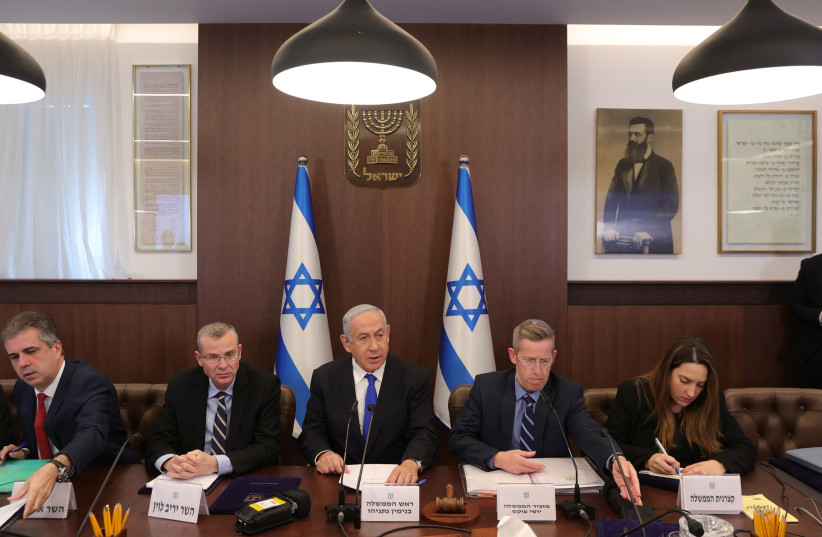by Tovah Lazaroff
Netanyahu spoke just days after the reports surfaced that Iran had increased its uranium enrichment to 84%.
 |
Israeli Prime Minister Benjamin Netanyahu attends the weekly
cabinet meeting in the prime minister's office Jerusalem, February 19,
2023.
(photo credit: Abir Sultan/Pool via REUTERS)
|
A credible military threat is the best way to deter Iran’s nuclear ambitions, but it becomes harder to do so the longer one waits, Prime Minister Benjamin Netanyahu told the Hertog National Security Conference in Tel Aviv on Tuesday night.
“The only thing that has reliably prevented rogue states from developing nuclear weapons is a credible military threat or credible military action.”
Prime Minister Benjamin Netanyahu
“The only thing that has credibly stopped rogue nations from developing nuclear weapons is a credible military threat or a credible military action,” Netanyahu said.
“You can couple that with crippling economic sanctions, but that's not a sufficient condition. A necessary condition, and an often sufficient condition, is credible military action,” he added.
“The longer you wait, the harder that becomes. We've waited very long,” he added in a public interview by Profession Walter Russell Mead. Former US Secretary of State Mike Pompeo and former US Ambassador to Israel David Friedman were conference participants.

Historically Iraq and Syria’s nuclear ambitions were thwarted by Israeli military force, he said, as he referenced both the 1981 Israeli strike against the Osirak nuclear reactor and the 2007 strike against a suspected nuclear reactor in Syria.
Libya dropped its pursuit of nuclear weapons out of fear of a US strike, Netanyahu said, while North Korea pursued its nuclear ambitions unabated.
Tehran suspended its nuclear program after the Gulf War out of fear the US would invade its country as it had gone into Iraq, Netanyahu explained. At that point was transformed into a secret program, disguised by by civilian reproach organizations.
Even the ability of the six world powers to sign the 2015 Joint Comprehensive Plan of Action with Tehran was based on a credible Israeli military threat, Netanyahu said.
Iran thought that “’This crazy guy in Jerusalem is going to bomb them unless we do something.’ So that's how Iran came to the table, but then they left the cash on the table and did a lousy agreement,” Netanyahu said.
Netanyahu spoke just days after the reports surfaced that Iran had increased its uranium enrichment to 84%, leaving only a small gap before it hits weapons-grade production at 90%.
“I can tell you that I will do everything in my power to prevent Iran from acquiring nuclear weapons. That is not merely an Israeli interest; it's an American interest; it's in the interest of the entire world,” he told the conference.
Netanyahu says normalization with Saudi Arabia possible
Netanyahu also spoke of the US-brokered Abraham Accords, under whose auspices Israel normalized ties with four Arab countries, and said he hoped Saudi Arabia would be the next country to sign a peace deal with the Jewish state.
“I think we've, we can have a quantum leap if the Saudi leadership decides that it wants to be formally part of this. Informally, they're part of this,” he said.
“I believe that pursuing a peace that is based on common interests, of using Israeli power – military, intelligence, technological and economic – to buttress local, that is, peace agreements and normalization agreements with our neighbors can help achieve two things. One, it can expand the circle of peace. Second, it can serve as a bulwark against Iran,” Netanyahu explained.
Tovah Lazaroff
Source: https://www.jpost.com/middle-east/article-732319
No comments:
Post a Comment